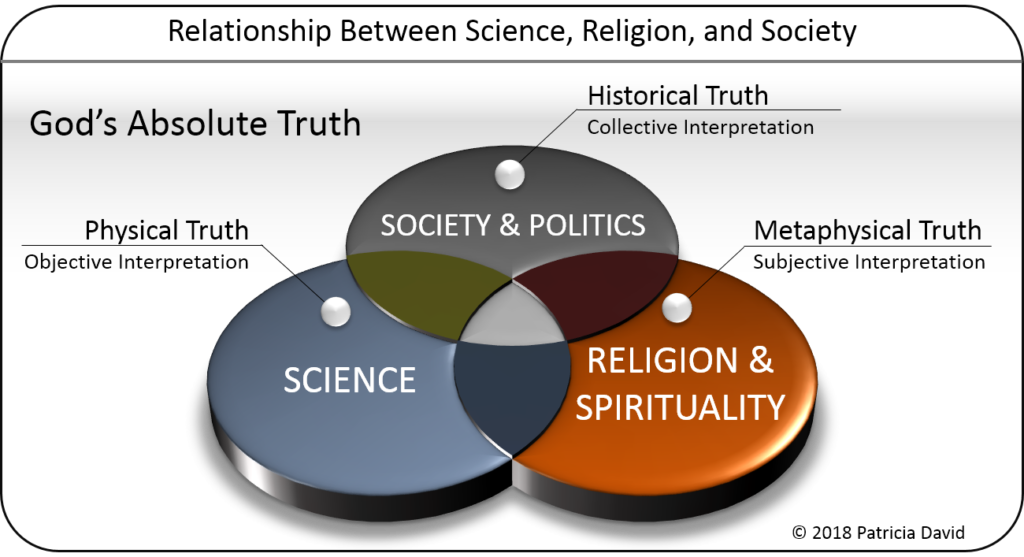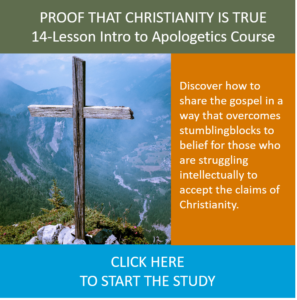The question is often raised – usually by atheistic science-minded individuals – if Christianity and science can co-exist. The questioners assume that religious people are against science because of their “unscientific” beliefs in God and a spiritual world. While I can’t explore this entire issue in one short blog post, I’d like to offer a way of looking at truth and the interrelatedness of religion, science, and society that I haven’t seen elsewhere. My hope is that this framework will help you to approach the question from a different perspective that will appeal to most common-sense-seeking individuals.
First, I want to make sure you understand that I believe in absolute truth. And that truth is founded in God. He is the Creator of truth and the only One who knows it fully. However, He chooses to reveal that truth to people. As you can see in the diagram below, there are (in my opinion) three types of truth that humans seek to discover: physical truth, metaphysical truth, and historical truth.
Physical truth is absolute, and those who seek it through science generally aspire to an objective interpretation of that truth. That is, the truth is fact-based, observable, and testable in the real world. It isn’t influenced (or shouldn’t be influenced) by personal opinions or feelings. This is the realm of science, which seeks to discover and explain the complexities of the universe through mathematical principles and concrete applications. God, as the Creator of the universe the scientist explores, is the source of this absolute truth and reveals it to those who seek it.
Metaphysical truth is also absolute truth, but those who seek it generally do so through subjective interpretation. It is truth that affects us personally and intellectually and spiritually. “Metaphysical” is what stands above or apart from physical truth. It encompasses abstract thoughts, ideas, philosophy, the concept of time, religion and spirituality. These are not as readily “provable” through an agreed-upon process like science is. But it is truth nonetheless. When it comes to religion, I would contend that God has revealed much of this truth through the Scriptures, so the truth isn’t “subjective” in the sense that we determine for ourselves what is and isn’t truth (e.g., “what’s true for me”), but this truth is appropriated subjectively and internalized.
Historical truth covers all the events that have taken place within time and space. As a society, we interpret these events collectively. We examine the causes of wars and the rationale behind movements that have influenced our contemporary societies and geopolitical positions. We interpret history collectively to understand our place in the world, even though there is an absolute truth of what really happened (and why), which may elude us without the proper historical research. This, too, God knows and often reveals to those who are seeking to understand it.
Using the chart below, let’s see how these three areas intersect.

The Intersection of Science and Religion/Christianity
There is a place of overlap between science and religion (specifically Christianity) in our diagram. Believe it or not, there are commonalities between these two realms of truth as well as common dangers. This is why I find the question, “Can Christianity and Science Co-Exist” to be somewhat absurd. Of course they can! And they do! They don’t only co-exist, they are complementary.
Both science and Christianity assume an orderly universe governed by natural laws that behave consistently. They both believe the mysteries of the universe can be understood. James Hannam, with a PhD in the History and Philosophy of Science from the University of Cambridge, in his article, “Science Owes Much to Both Christianity and the Middle Ages,” contends that most scientific exploration through the centuries came about precisely because Christians sought to understand a God who revealed Himself through the universe He created. Christianity has nearly always elevated the study of science.
There is a danger, nonetheless, when religion attempts to dictate science (e.g., the Pope’s trial of Galileo for daring to point out that the sun was the center of the solar system and not the earth) or when science attempts to dictate religion (e.g., when some more arrogant scientists claim there is no good or evil, or that God cannot possibly exist). While I don’t believe the Bible is contrary to science in any way, it also doesn’t attempt to answer every scientific question. Likewise, science isn’t equipped to address morality. Each has its separate, complementary spheres of truth. Disagreement, in my opinion, is generally only temporary, awaiting a more comprehensive understanding of truth through ongoing discovery of it.
There is also a danger when religion becomes science. That is, when we approach religion (Christianity) only with a view toward rational understanding without a subjective appropriation of faith (i.e., head knowledge without heart knowledge). Science faces the same danger when it moves past rationality to become a “religion” of its own. Let me unpack that for you. I’m a Christian, and my faith is based on rational proof, but it is much more than that. In fact, there is no evidence that could ever dissuade me from my faith. There is no “fact” that would ever convince me that God doesn’t exist or that I don’t have a relationship with Christ. Christianity is real and true, and it’s not possible for me to believe otherwise. That’s why so many scientists dislike “religion.” But hasn’t science itself crossed the line into religion? If warmer temperatures are proof of global warming (or “climate change”) and harsher winters are also proof of global warming, isn’t science in danger of saying there is no fact that could ever dissuade them from their hypothesis that the earth is warming? There are some “facts” of science (e.g., evolution and global warming) that approach the faith of a religion and aren’t open to debate or scrutiny, notwithstanding large bodies of evidence that contradict their “facts.”
The Intersection of Science and Religion with Politics and Society
In our diagram, notice the intersection of science and religion with society and politics. Both science and religion benefit society, but in different ways. Science can discover cures for diseases and ways to produce more productive crops. It has a tangible benefit on the welfare of society. And so does religion. Religion (specifically Christianity) provides principles of ethics and morality to ensure “goodness” and justice, and it brings contentment and meaning to life. And both science and religion are influenced in part by society, in that they attempt to educate people and to help them understand the complexities of their respective specialties. Understanding and relating to society is important to both science and religion.
The danger comes when either science or religion becomes overly influenced by society or politics. The question always comes down to, “What is to be gained?” When Constantine converted to Christianity in the 4th century, there was suddenly a good reason for others to convert – so they would be part of the winning religion. And there was good reason for the church to become increasingly intertwined with the Empire and submissive to it – because Constantine was building churches and advancing their religion. No wonder the Dark Ages led were characterized by compromise and controversy in the church; it had become too influenced by politics. So, too, today, in an effort to appease the masses, many churches have compromised long-held theological positions and convictions (metaphysical truth).
But science faces the same dangers. When government funds scientific research, or where there are societal benefits to specific scientific conclusions (e.g., best-seller books or TV appearances or lucrative contracts), “truth” can be perverted. Not that this always happens intentionally, but it does happen. For instance, society today is focused on gender fluidity and non-binary gender classifications. Scientists should be putting such folly to rest using pure science, but the influence of political correctness is proving too powerful for most. When science or religion compromises truth for the sake of gain or to avoid hostility, then they are no longer seekers and arbiters of truth.
The Intersection of All Three
At the very center of our diagram is a small space where all three realms – science, religion, and society – meet in harmony. If society embraces historical truth, if science embraces physical truth, and if religion embraces metaphysical truth, then there is a sweet spot of absolute harmony. The propensity for each of these areas to pervert their realm of truth is what causes conflict and the assumption that they cannot coexist.
So, what do we do with all this information?
If all truth comes from God, then physical, metaphysical, and historical truth are not incompatible. Each is meant to show us a part of God and how He governs His universe and relates to humankind. All truth points to Him. On a very practical level, when you meet a science-oriented person who is at odds with religion, it’s partly because he or she doesn’t understand that there is more than one kind of truth to be found. Explaining the diagram above may be helpful in opening them up to a conversation.
What else can we do?
- Be a lover of science, but be wary of “agendas” in research.
- Be a lover of God and His Word, but be wary of fallible leaders.
- Be a lover of people and society, but be wary of the corruption of sin and the deceitfulness of hearts.
When discussing Christianity or spirituality, look for common ground, but don’t compromise the Gospel message just to be accepted or to make truth sound more acceptable. Be confident. But also be informed.
Why most people really throw out Christianity in favor of science
Beware. There is another reason why most people who claim to be “science-minded” have an aversion to Christianity, and there isn’t a lot you can do to combat it. They simply have a predisposition against religion regardless of anything you say (making science a sort of religion of its own).
- They don’t like the God of Christianity. They look at all the evil in the world, tragedies, diseases, and injustice, and they conclude that the God who allows these things isn’t a God they want to be associated with. God doesn’t do what they would do if they were God. Listening to their heartaches (and there is usually at least one big one in their past) can help you to empathize with them and to share how you found grace and comfort and goodness in the face of great trials and difficulty.
- They don’t want to obey the God of Christianity. Let’s face it: if there is no God, there is no moral constraint on behavior. Most people want to do what they want to do and they don’t want any religious person making them feel guilty about it. Pointing out the justness of laws prohibiting murder and stealing (which come from the influence of Christianity) may help them begin to realize that there is a reason for rules and commands (even religious ones). And those rules and commands also benefit and protect us. But we need to make sure we have sought and discovered metaphysical truth ourselves, and that we’re living out authentic Christianity. Your life will reveal to them the benefits of a holy life lived out in joy.
- They don’t want to be associated with ignorant Christians. I know there are uneducated people on both sides of the aisle, but science-minded people are more prone to throwing this thought out there. They take great pride in their knowledge, much like Corinthians who thought they were so wise. But remember, God chooses the foolish things to confound the wise. Even so, we should read and study and seek to understand. Curiosity is a great equalizer. And I don’t know a science-minded person out there who wouldn’t take the time to explain to you what they’ve learned about some scientific theory. Ask questions and look for opportunities to ask metaphysical questions (questions that can’t be answered by science). Once they realize there is “truth” beyond just what they can discover empirically, they may be open to hearing about your experience with Christ. At the very least, they will admit that there may be something they don’t know. And that gives you an opportunity to share what you know without a doubt.
I hope this post has helped you to see that science and Christianity are complementary, as long as each remains unbiased and open, and as long as each remains true to the revealed truth it has discovered without feeling it can only do so by denying the truth the other has discovered. Ultimately, it is only by acquiescing to the God who is the Creator of absolute truth that science, Christianity, and society will be in harmony in their quest to discover what is truly true.
If you liked this article, you might also enjoy…








